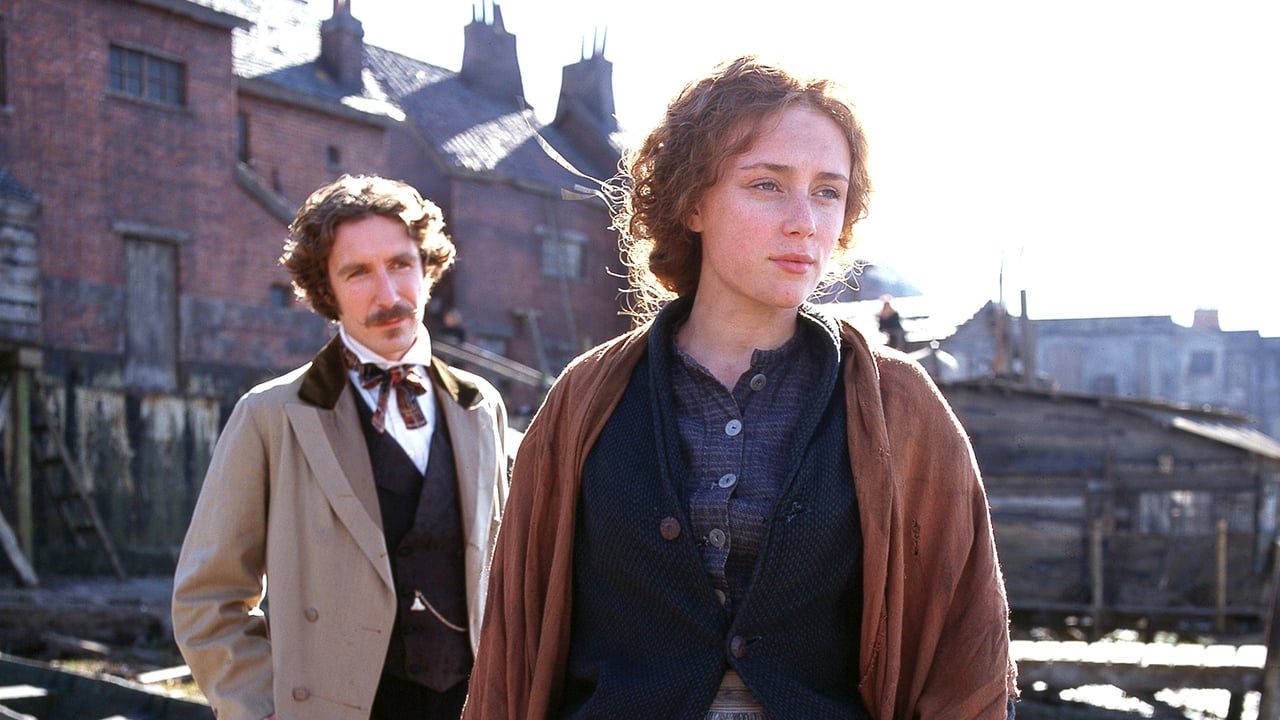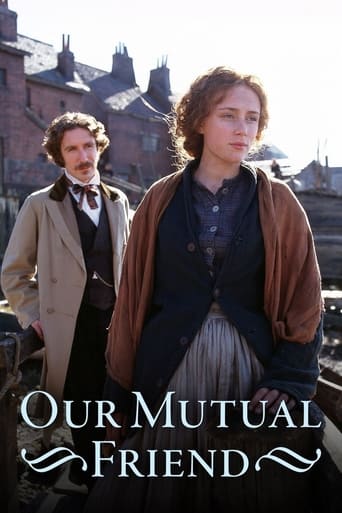

Our Mutual Friend (1998) is a BBC TV mini-series directed by Julian Farino.Our Mutual Friend was the last novel completed by Charles Dickens. It deals with issues about which Dickens was always concerned--social inequality, the hard lives of the poor, friendship, and love.This is one of Dickens' most complicated novels--Wikipedia lists 36 characters. The author gives each one of these characters--even the minor ones--a life and personality of her or his own.The plots is not only complicated, but somewhat forced and unrealistic. This is a movie to be enjoyed for the acting. In fact, the acting is superb. In my opinion, the best acting came from the supporting players. David Bradley portrays Roger (Rogue) Riderhood. He is a character in the novel who starts out fully evil, and ends up still fully evil. One look at Bradley and you think to yourself that here is an actor who was born to play the role.Kenneth Cranham portrays Silas Wegg, another character with no redeeming virtues. Katy Murphy is excellent as Jenny Wren, a doll's dressmaker. Although Jenny is small, apparently has scoliosis, and is "lame," she has a warm and kind heart. Martin Hancock portrays Sloppy, a young man who is also warm and kind. He too has disabilities, which he strives to overcome.The two female leads are both lovely, but in a very different way. Keeley Hawes portrays Lizzie Hexam, who is beautiful in an ethereal, Pre-Raphaelite way. She is one of the only characters who is truly good from the beginning until the end of the novel.The other female lead, Bella Wilfer, starts out the movie obsessed with obtaining money. In Victorian times, this meant marrying a wealthy man. In the beginning of the novel, a marriage of this type appears fully open to her. However, matters don't go smoothly. Bella is a character who matures and changes as the novel progresses. Anna Friel plays Bella. Director Farino chose a actress with perfect beauty, who can portray a woman with almost no warmth or concern for others.All the actors in this movie are highly talented. However, I give acting honors to Timothy Spall as Mr. Venus. Venus is a taxidermist and "articulator of bones." There is a calculation in everything he does. You can see it in his eyes and in his mannerisms. The man oozes calculation, desire, and venality. It would be worth seeing the movie just to watch Spall act.Because this film was made for TV, it works well on the small screen. Because it was produced by the BBC, it has high production values. I was pleased to learn that "Our Mutual Friend" has an IMDb rating of 8.3, which is extraordinarily high. If you love Dickens--or even if you don't--this is a movie you'll want to see. Don't miss it!
... View MoreBoth this adaptation and the one from 1976 do justice to Dickens' final novel, and are truly excellent on their own. Talking about preferences though, that is a very hard one as both are so good, for now from this viewer they're about equal in quality with this one getting the slight edge. The book is a mammoth one, very complex with lots of story lines, emotions and characters, a really great piece of literature if like a lot of Charles Dickens difficult to adapt. Excellent is not enough to describe this adaptation as it is one of the best Dickens adaptations I've seen and almost certainly ever been too. Not just that, but also one of the best period dramas of the past 25-30 years or so.It is a very opulent production, beautifully shot and from the grim streets to the rich aristocracy and waterfront the period detail is rich and stunning to watch. It is not quite as atmospheric as the earlier adaptation(though the scene with Bradley Headstone's stalking of Eugene through the city at night is a very atmospheric, suspenseful and quite haunting scene), but the contrast of the poor and rich is more convincingly done here(just look at the teeth of the poor for example). The haunting music score is noteworthy as well, and the dialogue is sophisticated, funny, whimsical, thoughtful and foreboding and mostly Dickenesian flavour. A couple of parts sound a little too simplified though, and the Weal and Hammer Pie scene was agreed better done in the earlier adaptation, that though is nowhere near enough to hinder anything and to be warranted as a flaw.Our Mutual Friend(1998) does a terrific job adapting such a complex and layered story, again like most Dickens dramatisations it's long at six hours but always engrossing and never dull. The pacing is beautifully measured, and perhaps more accessible than the 1976 version, which was much more deliberate, effectively so from personal perspective. Though a lot of 1970s-80s Dickens-adapted serials have been criticised for being tedious, a criticism that I myself don't share. The telling of it is very suspenseful with hope at the end, some nice comic moments, whimsy and heart-breaking tragedy complete with an evocative atmosphere and one of the most harrowing suicide scenes you'll ever see. Even with omissions it's also fairly faithful and maintains the spirit of Dickens' writing.The acting is exceptional all round, and helped by the smart direction and the rich, detailed way the characters are handled. Particularly good are Steven Mackintosh and David Morissey, Mackintosh's performance is restrained, nuanced and assertive- much more convincing age-wise than the Rokesmith in the earlier adaptation- while Morrissey isn't just chilling and tormented but brings tremendous depth to the besotted schoolteacher who descends into obsessive madness. Paul McGann has some great lines, a few among the best of the entire adaptation, and manages to be amusing and dashing. Keeley Hawes is positively luminous and plays Lizzie with great charm and dignity, Lesley Dunlop's interpretation is a little more mature but Hawes is hardly fresh-out-of-finishing-school-type as described in a positive Amazon review of the 1976 adaptation.Anna Friel is very beautiful as well as witty and charming, Bella is not the most pleasant of characters but Friel brings that across while also making her attractive too. Timothy Spall is humble and appealingly oddball and Peter Vaughan(a sinister Mr Tulkinghorn in the superb 1985 adaptation of Bleak House) and Pam Ferris play the Boffins with great character and gusto. Kenneth Cranham plays Silas Wegg with real ferocity with touches of humour, while David Bradley's Riderhood is cool and calculating and Margaret Tyzack is a formidable presence. Overall, outstanding and among the best Dickens adaptations and period dramas there's been in the past 25-30 years. 10/10 Bethany Cox
... View MoreFine adaptation of a powerful Dickens novel, full of the frustrating spectrum of strengths and weakness inherent in every Dickens story; from the powerful rage he expresses in documenting social injustice, to his goody-two-shoes pedestal-bound heroines. It's about class, love, the river, London, and it's full of great scenes and haunting visuals: witness a tormented Bradley Headstone stalking Eugene Wrayburn through the streets of the City at night. The length of the series does the work justice; the casting is outstanding expect no less from any good BBC adaptation. The always excellent, underrated Stephen Mackintosh brings complexity and delicacy to his John Rokesmith; Paul McGann gets the best lines; and the entire cast brings the writing to life in a good-looking production - who cares if perhaps it all looks just a tad better than it should. A staple in my DVD collection, highly recommended.
... View MoreMy copy of this version is treasured part of my video library, with solid performances from the cast and a Bradley Headstone suicide scene that chills me to the bone. But I long to see again the version made in 1976, which launched the careers of Warren Clarke, Jane Seymour, besides polishing the reputations of more established actors, like the great Leo McKern, Kathleen Harrison and Ronald Lacey - and cast expressions like "anatomical pursuits" and "mellering to the organ" into our family's private jargon for 25 years.What I could not understand about this production was the removal of some choice Dickens dialogue, particularly between Messrs Boffin & Wegg. Peter Vaughan and Kenneth Cranham had to make do with a very cut down version of the "Weal & Hammer Pie" conversation, which Leo McKern and Alfie Bass made so hilarious I nearly climbed inside my telly.But this is minor carping and should not put off the prospective viewer from a beautifully filmed production, one of the best period drama versions in recent decades. I'll watch it once a year until my tape wears out.If I could only get hold of a copy of the 1976 version though. Now that WOULD be mellering to the organ!
... View More